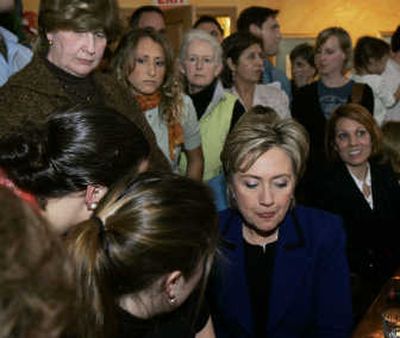Candidates take last plunge before New Hampshire

MANCHESTER, N.H. – Hillary Rodham Clinton choked up. Barack Obama flubbed his lines. Even Chuck Norris, Mike Huckabee’s action-star sidekick, was laid low.
Fatigue, tension and, for some, the prospect of harsh judgment weighed heavily on White House hopefuls – and their supporters – as they churned across New Hampshire in a final burst of campaigning before today’s first-in-the-nation primary.
A record turnout of more than 500,000 voters, many of them independents, was expected, reflecting the nature of the Democratic and Republican races, and New Hampshire’s pride in its traditional role of culling the field of contenders.
The latest surveys showed Sen. Obama, of Illinois, enjoying a surge of support after his victory in Thursday’s Iowa caucuses, with Sen. Clinton of New York trailing well behind followed by former Sen. John Edwards, of North Carolina, and New Mexico Gov. Bill Richardson.
On the Republican side, Sen. John McCain, of Arizona, and former Massachusetts Gov. Mitt Romney were locked in a close contest. Former Arkansas Gov. Huckabee – the GOP winner in Iowa – was far behind, bunched with ex-New York Mayor Rudolph W. Giuliani and Rep. Ron Paul, of Texas.
The state is crucial for Clinton, who is trying to bounce back from a third-place finish in Iowa, and her teary eyes – brought on by a friendly question about the rigors of campaigning – introduced uncertainty to the contest.
Clinton’s rivals chose to ignore or brush aside the moment. Obama offered no comment, and Edwards said: “These campaigns are grueling, and they’re tough and difficult affairs.”
Some suggested the tears might benefit Clinton.
“Her campaign in New Hampshire has been a portrait of self-control, of organization and discipline,” said Dante Scala, a University of New Hampshire political scientist. “If anything, it probably lacked a little spontaneity. This adds some humanity.”
Perhaps of greater concern for Clinton are growing doubts among her supporters.
“I don’t think there is any question that there is a lot of nervousness about where this is all headed,” said Leon Panetta, a Clinton donor, who served as President Clinton’s White House chief of staff.
For McCain and Romney, their candidacies might be riding on New Hampshire.
McCain, the winner in the 2000 GOP New Hampshire primary, is counting on a victory to complete his comeback after many left his campaign for dead over the summer. Romney, as a next-door neighbor, needs a win to recover from his second-place showing in Iowa, behind the vastly outspent Huckabee.
On Monday, Romney was looking past Clinton, yet another sign of her diminished stature. He argued that McCain, who has served 21 years in the Senate, was too weak to face Obama, a first-term senator, in the general election.
“There is no way that our party would be successful in the fall if we put forward a long-serving senator to stand up against Barack Obama’s message of change,” Romney said in Stratham.
After repeatedly clashing with Romney during two bitter debates over the weekend, McCain largely opted not to engage.
“Let’s tell voters why they should vote for us,” he said.
During a frantic day of campaigning, McCain charged from one side of New Hampshire to the other, retracing the trail he followed the day before his 2000 victory. Departing from his relaxed town hall meeting style, McCain’s events were short, staccato rallies of no more than 20 minutes. In Keene, he took one of his few pokes at Romney.
“One of my opponents not long ago said you don’t need foreign policy experience,” McCain said, taking a bit of creative license. “My friends, look at the world, look at the world and see if you need that kind of experience to make the kind of judgments that are necessary.”
Clinton and Obama matched their Republican counterparts stride for stride, though it was clear the campaign was taking a toll on both of them.
Normally the most controlled of candidates, Clinton teared up and her voice broke at the end of a morning stop when she was asked about the physical wear-and-tear of running for president.
“It’s not easy,” she told a small group of undecided voters in Portsmouth.
She referred to some less-than-flattering photographs that have circulated widely on the Internet.
“Some people think elections are a game,” Clinton said. “They think it’s who’s up or who’s down. Some of us put ourselves out here and do this against some pretty difficult odds. And we do it – each one of us – because we care about our country.”
Obama began his day apologizing for his scratchy voice. He told a crowd in Claremont that a doctor had told him to stop talking. Realistically, that was not an option. So Obama worked his way through an 18-hour schedule, rasping out his message of change, sipping tea with lemon and honey.
Obama ramped up his criticism of Clinton – without mentioning her by name – recalling a debate where she warned against offering false hopes.
“There’s no such thing,” Obama declared before a standing-room-only crowd at the Lebanon Opera House, where hundreds more were stranded outside. “Did JFK look up at the moon and say, ‘Ah, false hope. Too far. Reality check. Can’t do it.’ “
Edwards, meantime, went all-out with a nonstop, 36-hour bus tour that threaded around the coast, the White Mountains and the borders of Massachusetts, Vermont and Maine.
Other candidates – banking on later victories – felt less pressure, and their schedules reflected as much.
Huckabee had just three events. At a stop in Mason, down a long, winding country road, he introduced Norris and pitched the actor’s fitness equipment.
Still, Huckabee managed to draw some of the biggest crowds of his campaign, numbering in the hundreds, even though the celebrity half of the “Huck & Chuck” roadshow – as the campaign calls it – was forced to skip a noontime event in Concord due to illness.